Alfa Romeo Junior vs BMW 3 Series Saloon - Differences and prices compared
Compare performance (280 HP vs 530 HP), boot space and price (26100 £ vs 39900 £ ) at a glance. Find out which car is the better choice for you – Alfa Romeo Junior or BMW 3 Series Saloon?
Costs and Efficiency:
Price and efficiency are often the first things buyers look at. Here it becomes clear which model has the long-term edge – whether at the pump, the plug, or in purchase price.
Alfa Romeo Junior has a clearly advantage in terms of price – it starts at 26100 £ , while the BMW 3 Series Saloon costs 39900 £ . That’s a price difference of around 13842 £.
Fuel consumption also shows a difference: BMW 3 Series Saloon manages with 2.40 L and is therefore decisively more efficient than the Alfa Romeo Junior with 4.80 L. The difference is about 2.40 L per 100 km.
As for electric range, the Alfa Romeo Junior performs significantly better – achieving up to 410 km, about 309 km more than the BMW 3 Series Saloon.
Engine and Performance:
Under the bonnet, it becomes clear which model is tuned for sportiness and which one takes the lead when you hit the accelerator.
When it comes to engine power, the BMW 3 Series Saloon has a clearly edge – offering 530 HP compared to 280 HP. That’s roughly 250 HP more horsepower.
In acceleration from 0 to 100 km/h, the BMW 3 Series Saloon is decisively quicker – completing the sprint in 3.50 s, while the Alfa Romeo Junior takes 5.90 s. That’s about 2.40 s faster.
In terms of top speed, the BMW 3 Series Saloon performs somewhat better – reaching 250 km/h, while the Alfa Romeo Junior tops out at 206 km/h. The difference is around 44 km/h.
There’s also a difference in torque: BMW 3 Series Saloon pulls clearly stronger with 700 Nm compared to 345 Nm. That’s about 355 Nm difference.
Space and Everyday Use:
Cabin size, boot volume and payload all play a role in everyday practicality. Here, comfort and flexibility make the difference.
Both vehicles offer seating for 5 people.
In curb weight, Alfa Romeo Junior is to a small extent lighter – 1380 kg compared to 1575 kg. The difference is around 195 kg.
In terms of boot space, the BMW 3 Series Saloon offers slightly more room – 480 L compared to 415 L. That’s a difference of about 65 L.
When it comes to payload, BMW 3 Series Saloon slightly takes the win – 495 kg compared to 420 kg. That’s a difference of about 75 kg.
Who wins the race in the data check?
The BMW 3 Series Saloon is far ahead overall in the objective data comparison.
This result only shows which model scores more points on paper – not which of the two cars feels right for you.
Costs and Consumption
View detailed analysis
Engine and Performance
View detailed analysis
Dimensions and Body
View detailed analysis
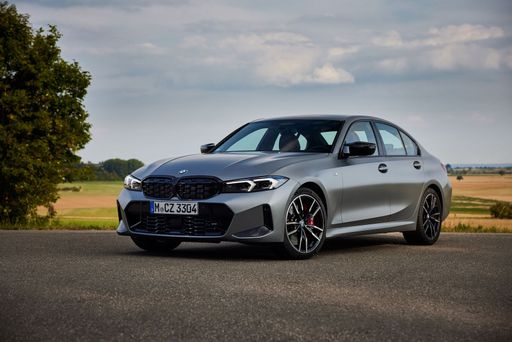
BMW 3 Series Saloon
Alfa Romeo Junior
The Alfa Romeo Junior captures the essence of Italian design with its sleek lines and compact dimensions, making it an icon of elegance and performance. With a spirited driving experience and a charming retro aesthetic, it appeals to enthusiasts and casual drivers alike. This delightful car embodies the brand's rich heritage while remaining a fun and engaging option for those seeking a unique automotive experience.
details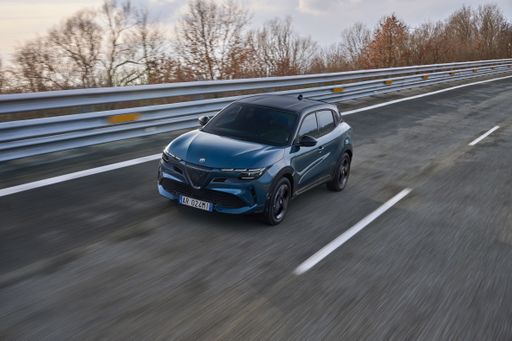

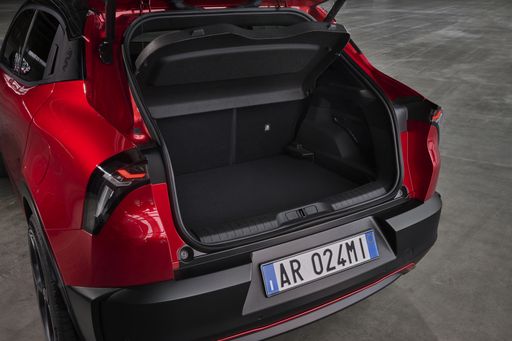
BMW 3 Series Saloon
The BMW 3 Series saloon is a driver's car in a suit, blending poised handling with a cabin that feels more premium than its practicality suggests. It’s composed enough for daily duties yet playful enough to keep weekend drives interesting, making it a sensible choice for buyers who still want to have fun.
details
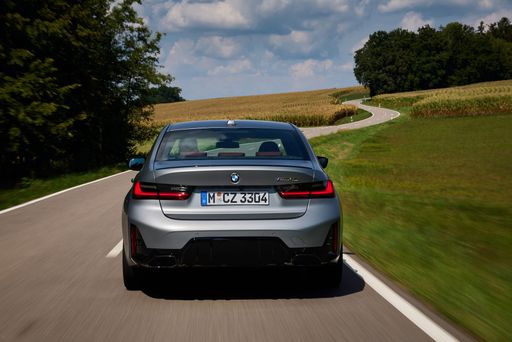
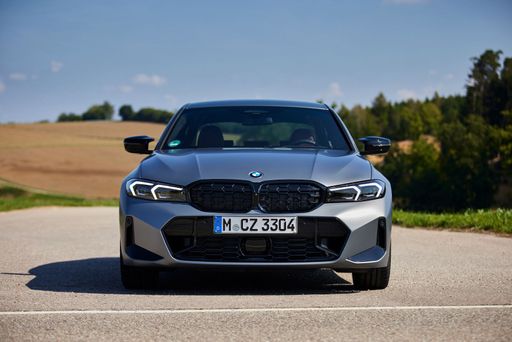
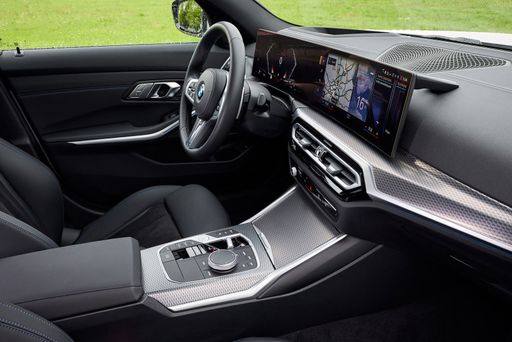
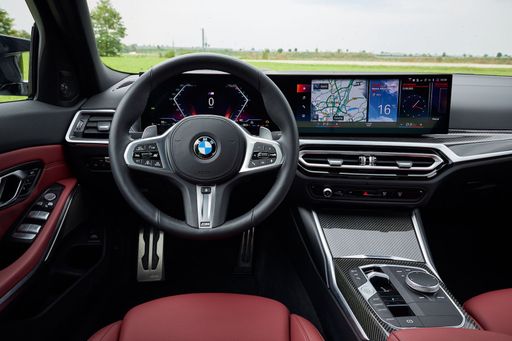
Costs and Consumption |
|
|---|---|
|
Price
26100 - 41600 £
|
Price
39900 - 91000 £
|
|
Consumption L/100km
4.8 - 5.4 L
|
Consumption L/100km
2.4 - 10.1 L
|
|
Consumption kWh/100km
15.1 - 17.5 kWh
|
Consumption kWh/100km
-
|
|
Electric Range
344 - 410 km
|
Electric Range
96 - 101 km
|
|
Battery Capacity
0.4 - 51 kWh
|
Battery Capacity
19.50 kWh
|
|
co2
0 - 119 g/km
|
co2
54 - 227 g/km
|
|
Fuel tank capacity
44 - 45 L
|
Fuel tank capacity
40 - 59 L
|
Dimensions and Body |
|
|---|---|
|
Body Type
SUV
|
Body Type
Sedan
|
|
Seats
5
|
Seats
5
|
|
Doors
5
|
Doors
4
|
|
Curb weight
1380 - 1689 kg
|
Curb weight
1575 - 1960 kg
|
|
Trunk capacity
340 - 415 L
|
Trunk capacity
375 - 480 L
|
|
Length
4173 mm
|
Length
4713 - 4714 mm
|
|
Width
1781 mm
|
Width
1827 - 1903 mm
|
|
Height
1505 - 1538 mm
|
Height
1440 - 1446 mm
|
|
Max trunk capacity
1205 - 1280 L
|
Max trunk capacity
-
|
|
Payload
390 - 420 kg
|
Payload
405 - 495 kg
|
Engine and Performance |
|
|---|---|
|
Engine Type
Electric, Petrol MHEV
|
Engine Type
Diesel MHEV, Petrol, Petrol MHEV, Plugin Hybrid
|
|
Transmission
Automatic
|
Transmission
Automatic, Manuel
|
|
Transmission Detail
Reduction Gearbox, Dual-Clutch Automatic
|
Transmission Detail
Automatic Gearbox, Manual Gearbox
|
|
Drive Type
Front-Wheel Drive, All-Wheel Drive
|
Drive Type
Rear-Wheel Drive, All-Wheel Drive
|
|
Power HP
136 - 280 HP
|
Power HP
150 - 530 HP
|
|
Acceleration 0-100km/h
5.9 - 9.1 s
|
Acceleration 0-100km/h
3.5 - 8.6 s
|
|
Max Speed
150 - 206 km/h
|
Max Speed
218 - 250 km/h
|
|
Torque
230 - 345 Nm
|
Torque
250 - 700 Nm
|
|
Number of Cylinders
3
|
Number of Cylinders
4 - 6
|
|
Power kW
107 - 207 kW
|
Power kW
110 - 390 kW
|
|
Engine capacity
1199 cm3
|
Engine capacity
1995 - 2998 cm3
|
General |
|
|---|---|
|
Model Year
2024 - 2025
|
Model Year
2024 - 2025
|
|
CO2 Efficiency Class
A, C, D
|
CO2 Efficiency Class
D, E, F, G, B
|
|
Brand
Alfa Romeo
|
Brand
BMW
|
What drive types are available for the Alfa Romeo Junior?
Available configurations include Front-Wheel Drive or All-Wheel Drive.




